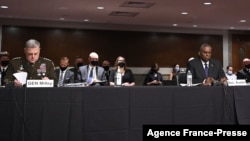Top military officials are defending the U.S. evacuation from Afghanistan, insisting that despite initial difficulties, the effort "exceeded all expectations."
There has been unrelenting criticism over the collapse of the U.S.-backed Afghan government, and the airlift that failed to evacuate all Americans in Afghanistan as well as Afghan allies at risk of facing retribution with the Taliban in control.
But U.S. Defense Secretary Lloyd Austin told the Senate Armed Services Committee Tuesday that the evacuation went as smoothly as possible, and that no other military in the world could have done any better.
"It was the largest airlift conducted in U.S. history, and it was executed in just 17 days," he told committee members. "We planned to evacuate between 70,000 and 80,000 people. They evacuated more than 124,000."
"Was it perfect? Of course not," Austin added, calling the first two days of the airlift "difficult," as huge crowds rushed to the airport following the Taliban's unexpectedly swift takeover.
"We moved so many people so quickly out of Kabul that we ran into capacity and screening problems at intermediate staging bases outside of Afghanistan," he said.
The defense secretary also lamented the August 26 suicide bombing that killed 13 U.S. service members and 169 Afghans at the Kabul airport, and a drone strike days later that killed up to 10 Afghan civilians, including seven children.
But he defended the planning process, saying it allowed the military to get additional troops to Hamid Karzai International Airport quickly, because they were already in the region.
And Austin said that the military was not giving up on helping Americans who want to leave Afghanistan.
Some lawmakers, however, blasted the administration’s approach, describing the evacuation as a tragedy and a horror show.
"We all witnessed a horror of the president's own making," said Jim Inhofe, the committee’s top Republican lawmaker, calling the way events played out "avoidable."
"Everything that happened was foreseen," he said. “President Biden and his advisers didn't listen to the combat commander. He didn't listen to Congress, and he failed to anticipate what all of us knew would happen."
Inhofe also accused the Biden administration of failing to create a plan to counter the terror threats likely to emerge in Afghanistan with the Taliban in control.
But Austin and the chairman of the Joint Chiefs of Staff, General Mark Milley, told lawmakers that while counterterrorism operations would be difficult, the military remains committed to ensuring the safety of the United States.
“That mission will be much harder now, but not impossible," Milley told lawmakers, warning threats from both al-Qaida and the Islamic State terror group could manifest in the next one to three years.
"A reconstituted al-Qaida or ISIS with aspirations to attack the United States is a very real possibility," he said, using an acronym for Islamic State.
"We must remember that the Taliban was and remains a terrorist organization and they still have not broken ties with al-Qaida" Milley said. "I have no illusions as to who we are dealing with."





